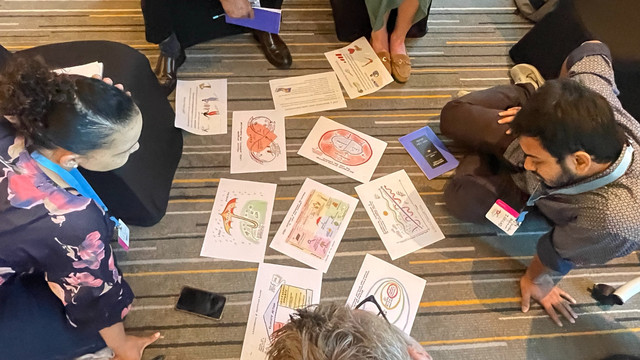D&C Days in Lima to highlight 'historic opportunity' to reduce poverty and emissions to zero (#zerozero)
Extreme poverty and the impacts of climate change, which already affect many millions of people worldwide, can be overcome by far-sighted, joined-up action on both at once, the Development and Climate Days event at UN climate talks in Peru will hear.

Delegates at the 20th session of the Conference of the Parties (COP20) in Lima, Peru (Photo: Kate Wilson/IIED)
The heads of the Red Cross Red Crescent Climate Centre, the International Institute for Environment and Development (IIED), the Overseas Development Institute (ODI), and the Climate and Development Knowledge Network (CDKN) are together calling for "substantially expanded ambitions to tackle both extreme poverty and greenhouse gas emissions".
The timetable for agreeing a new global climate agreement, new goals for sustainable development, and a new international disasters agreement in 2015 presents an "historic opportunity" to put both extreme poverty and net emissions on a path to zero, they said in a joint statement. As delegates began the COP 20 talks, the four agency directors highlighted the chance for "a unified, high ambition across the three key global agendas to be agreed in 2015".
The agencies are organising the 12th Development and Climate Days (D&C Days) event this coming weekend 6-7 December at COP 20, hashtagged on Twitter as #zerozero. (See and subscribe to a Twitter list of organisations and individuals involved). D&C Days has been an established event at the annual UN climate talks for more than a decade.
"Strong and coherent links between the three agreements could ensure that sustainable development goals and disaster risk reduction efforts are climate-smart," according to a joint statement by Dr Maarten van Aalst, director of the Red Cross Red Crescent Climate Centre; Sam Bickersteth, chief executive of CDKN; Camilla Toulmin, director of IIED; and Kevin Watkins, director of Overseas Development Institute (ODI).
"Effective climate mitigation and adaptation strategies are pivotal to eradicating poverty," they added. "Without integration, these agreements will fail to address the development possibilities for the poorest and most vulnerable in a changing climate."
The numbers of people in extreme poverty have fallen in the past two decades, bringing the possibility of ending extreme poverty within reach, yet climate change threatens to reverse development progress. Climate change will lower crop yields and food security, reduce the freshwater available for human needs, and lower fish stocks in the oceans.
"Zerozero is about increasing people's resilience, and doing it in a way that will also safeguard gains for future generations," said Dr Van Aalst, who is also a lead author of the IPCC's Fifth Assessment Report, in an individual comment. "Climate risks hit the most vulnerable hardest: people living beneath unstable slopes or on crumbling coastlines, farmers battling floods one year and drought the next, city-dwellers facing climate-related urban issues."
"Climate change is already undermining livelihoods, economic growth and national budgets in developing countries and hence action on poverty reduction and climate change must be interwoven," added Bickersteth. "Least developed countries are among the leaders on green growth and climate resilience – and offer inspiration and practical building blocks from which others can learn. It is such tangible solutions, and proposals for collective action, that Development and Climate Days 2014 seeks to foster."
Watkins said: "With the right policies in place a low carbon transition can act as a catalyst for poverty reduction, jobs creation and inclusive growth. We need to consign to history the idea that there is a trade-off between greener growth and development."
Toulmin summarised: "Low carbon development offers big opportunities for poor countries to achieve growth with better livelihoods. The world is looking to its leaders to create a fairer future, so we must see rapid action and concrete measures from everyone in Lima, if we are to achieve zero poverty and zero net emissions in time to prevent a global temperature rise above 2ºC."



